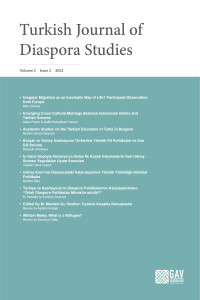Abstract
References
- Adams, K. L., & Brink, D. T. (1991). Joshua A Fishman on language Planning: “Brotherhood Does not Mean Uniformity”. D. F. Marshall (Ed.), Focus on language planning: Essays in honor of Joshua A. Fishman (Vol. 3) içinde (ss. 7-27), Amsterdam: John Benjamin’s Publishing Company. https:// doi.org/10.1075/z.fishfest3.04ada
- Агентство Азери-Пресс [АПА]. (2021, Апреля 29). Объявлена Численность Азербайджанцев В Грузии. https://apa.az/ru/xeber/novosti-evropi/Obuyavlena-chislennost-azerbajdzhancev-v- Gruzii-444601, (Erişim Tarihi: 17.03.2022).
- Asker, A., & Kahraman, A. (2016). Gürcistan’da Devletleşme, Kimlik İnşası ve Müslüman Topluluklar.
- A. Aydıngün, A. Asker & A. Y. Şir (Ed.), Gürcistan’daki Müslüman Topluluklar: Azınlık Hakları, Kimlik, Siyaset içinde (ss. 23-47). Ankara: AVİM Yay., Terazi Yayıncılık.
- Asker, A., & Öğütcü, Ö. N. (2016). Borçalı Türkleri: İslam, Mezhep ve Din Temelli Sorunlar. A. Aydıngün, A. Asker & A. Y. Şir (Ed.), Gürcistan’daki Müslüman Topluluklar: Azınlık Hakları, Kimlik, Siyaset içinde (ss. 219-47). Ankara: AVİM Yay., Terazi Yayıncılık.
- Aydıngün, A., & Asker, A. (2012). Gürcistan: De Jure Üniter, De Facto Parçalı. İ. Aydıngün & Ç. Balım (Ed.), Bağımsızlıklarının Yirminci Yılında Azerbaycan, Gürcistan ve Ukrayna içinde (ss. 117-208). Ankara: Atatürk Kültür Merkezi.
- Azərbaycan Dövlət İnformasiya Agentliyi [AZƏRTAC]. (2021, May 17). Dövlət Komitəsi Gürcüstanda yaşayan azərbaycanlılara çağırış edib. https://azertag.az/xeber/Dovlet_Komitesi_Gurcustanda_ yasayan_azerbaycanlilara_chagiris_edib-1782181, (Erişim Tarihi: 02.04.2022).
- Baharlı, M. (2008). Quzey’in Azərbaycanca’sı, Güney’in Türkcə’si. https://turuz.com/storage/users/bey- 1395/0915-Quzey_Azerbaycanin_Azerbaycancasi,_Guney_Azerbaycanin_Turkcesi-M.B-2008. pdf
- Bani-Shoraka, H. (2007). Azerbaycan Dili ve Kimliği Yeniden Canlanıyor mu?. Orta Asya ve Kafkasya Araştırmaları, (03), 160-167.
- Blommaert, J. (1996). Language planning as a discourse on language and society: The linguistic ideology of a scholarly tradition. Language problems and language planning, 20(3), 199-222. https://doi. org/10.1075/lplp.20.3.01blo
- Christian, D. (1988). Language planning: the view from linguistics. F. Newmeyer (Ed.), Linguistics: The Cambridge Survey: Volume 4, Language: The Socio-Cultural Context içinde (ss. 193-209), Cambridge: Cambridge University Press. https://doi.org/10.1017/CBO9780511620577.012
Abstract
Language is an important factor that constitutes national identity. Language policies have become a state structure that aims to unite peoples under state rule, as well as organize and reorganize their lives. The establishment of a political central authority that dominates the society’s thoughts through language is the most essential element of social construction processes in the new world order. This study examines the current situation of Azerbaijani Turkish in Borchali (Georgia) and South Azerbaijan (Iran) from socio-political and sociolinguistic perspectives. In this context, language policies, language planning and language rights, and monolingualism with its assimilationist characteristics, are included in the theoretical framework for the first part of this research. The second part explains the language policy implemented in Georgia and discusses the mother tongue education problems faced by minorities. Data on language policy practices in Iran, the position of Azerbaijani Turkish against the titular language, and the problems related to South Azerbaijan Turks’ right to education in their mother tongue are interpreted in the third part. In the last section, attention is drawn to the role of language policy in Azerbaijan’s multi-culturalism model, as a solution method for the aforementioned problems.
References
- Adams, K. L., & Brink, D. T. (1991). Joshua A Fishman on language Planning: “Brotherhood Does not Mean Uniformity”. D. F. Marshall (Ed.), Focus on language planning: Essays in honor of Joshua A. Fishman (Vol. 3) içinde (ss. 7-27), Amsterdam: John Benjamin’s Publishing Company. https:// doi.org/10.1075/z.fishfest3.04ada
- Агентство Азери-Пресс [АПА]. (2021, Апреля 29). Объявлена Численность Азербайджанцев В Грузии. https://apa.az/ru/xeber/novosti-evropi/Obuyavlena-chislennost-azerbajdzhancev-v- Gruzii-444601, (Erişim Tarihi: 17.03.2022).
- Asker, A., & Kahraman, A. (2016). Gürcistan’da Devletleşme, Kimlik İnşası ve Müslüman Topluluklar.
- A. Aydıngün, A. Asker & A. Y. Şir (Ed.), Gürcistan’daki Müslüman Topluluklar: Azınlık Hakları, Kimlik, Siyaset içinde (ss. 23-47). Ankara: AVİM Yay., Terazi Yayıncılık.
- Asker, A., & Öğütcü, Ö. N. (2016). Borçalı Türkleri: İslam, Mezhep ve Din Temelli Sorunlar. A. Aydıngün, A. Asker & A. Y. Şir (Ed.), Gürcistan’daki Müslüman Topluluklar: Azınlık Hakları, Kimlik, Siyaset içinde (ss. 219-47). Ankara: AVİM Yay., Terazi Yayıncılık.
- Aydıngün, A., & Asker, A. (2012). Gürcistan: De Jure Üniter, De Facto Parçalı. İ. Aydıngün & Ç. Balım (Ed.), Bağımsızlıklarının Yirminci Yılında Azerbaycan, Gürcistan ve Ukrayna içinde (ss. 117-208). Ankara: Atatürk Kültür Merkezi.
- Azərbaycan Dövlət İnformasiya Agentliyi [AZƏRTAC]. (2021, May 17). Dövlət Komitəsi Gürcüstanda yaşayan azərbaycanlılara çağırış edib. https://azertag.az/xeber/Dovlet_Komitesi_Gurcustanda_ yasayan_azerbaycanlilara_chagiris_edib-1782181, (Erişim Tarihi: 02.04.2022).
- Baharlı, M. (2008). Quzey’in Azərbaycanca’sı, Güney’in Türkcə’si. https://turuz.com/storage/users/bey- 1395/0915-Quzey_Azerbaycanin_Azerbaycancasi,_Guney_Azerbaycanin_Turkcesi-M.B-2008. pdf
- Bani-Shoraka, H. (2007). Azerbaycan Dili ve Kimliği Yeniden Canlanıyor mu?. Orta Asya ve Kafkasya Araştırmaları, (03), 160-167.
- Blommaert, J. (1996). Language planning as a discourse on language and society: The linguistic ideology of a scholarly tradition. Language problems and language planning, 20(3), 199-222. https://doi. org/10.1075/lplp.20.3.01blo
- Christian, D. (1988). Language planning: the view from linguistics. F. Newmeyer (Ed.), Linguistics: The Cambridge Survey: Volume 4, Language: The Socio-Cultural Context içinde (ss. 193-209), Cambridge: Cambridge University Press. https://doi.org/10.1017/CBO9780511620577.012
Details
| Primary Language | English |
|---|---|
| Subjects | International Relations |
| Journal Section | Research Articles |
| Authors | |
| Publication Date | September 30, 2022 |
| Submission Date | August 4, 2022 |
| Published in Issue | Year 2022 Volume: 2 Issue: 2 |
Turkish Journal of Diaspora Studies is licensed under a Creative Commons Attribution-NonCommercial 4.0 International License (CC BY NC).


